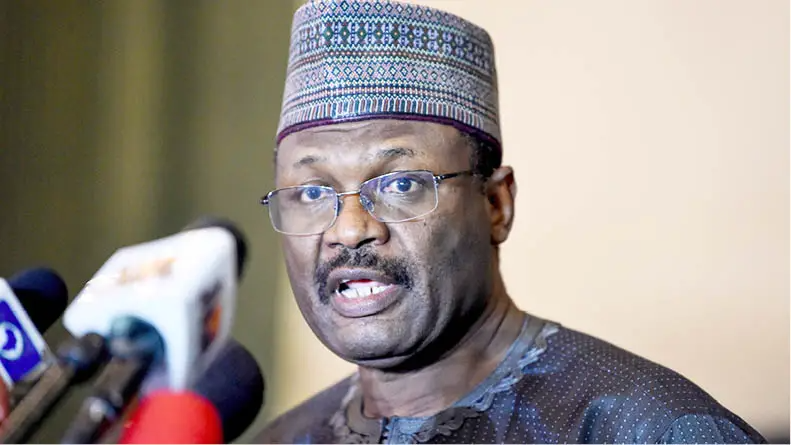By Editorial
Copyright leadership

Conducting elections in Nigeria, with its geopolitical diversities and cultural peculiarities, is not a job for anyone seeking applause. It is like the proverbial devil’s alternative—any decision taken at any time will affect someone’s interest for good or bad. In such a situation, relying on one’s conscience and the desire to do what is right regardless of who gets hurt becomes paramount.
With this in mind, it is only natural that the chairman of the Independent National Electoral Commission (INEC) must be someone with a thick skin ready to take pot shots with stoic equanimity and a mind that focuses on the greater good for the greater number.
Professor Mahmood Yakubu was appointed chairman of INEC to succeed Professor Muhammadu Jega, who left office in a flurry of goodwill after having conducted an election in which the opposition won and the incumbent accepted defeat. Yakubu assumed office, determined to build on this internationally acknowledged achievement, desirous of making his own contributions to the nation’s democratic experiment.
His take-off point was in technological Innovation. He introduced automation initiatives, the INEC Result Viewing (IReV) portal, and biometric verification to improve the electoral process and reforms to enhance the credibility and transparency of Nigeria’s electoral process.
The aim was to restore faith in the system and encourage higher voter turnout. To many, the BVAS system and the IReV deployment represented a significant leap towards enabling voters to track results in real time. This was part of his vision to create a system that would empower citizens to protect the sanctity of their votes.
Within this context, he engaged with the National Assembly on key electoral reforms, including constitutional and Electoral Act amendments. Under his watch, the Electoral Commission made forays into civic engagement, which has increased citizen participation and strategic leadership, demonstrating competence and integrity. One example of this was his push for a comprehensive review of election outcomes to address discrepancies and mistrust.
Yakubu made efforts to ensure electoral security, reduce violence, and enhance the credibility of elections. His commitment to democratic governance, electoral integrity, and institutional reform undoubtedly consolidated the commission’s zeal to improve the democratic process in the country. His willingness to build consensus around necessary reforms reinforced his commitment to ensuring that future elections are conducted with greater integrity.
As he prepares to exit the office, Yakubu leaves a legacy that will stand the test of time, such as building institutional memory for future Commissions. These include several reports, position papers, and policy papers. Most importantly, he established the first Election Museum in the country to preserve the rich but checkered history of electoral management in Nigeria.
To this end, the Commission upgraded the Direct Data Capture Machines (DDCMs) to a more efficient and portable INEC Voter Enrolment Device (IVED), as well as the deployment of a two-way Advanced Biometric Identification System (ABIS)
The Commission has been operating from a temporary office with its own administrative and logistical management constraints. After many years of challenges with office accommodation, the Commission headquarters will soon have a new seven-storey building opposite the present location on Zambezi Crescent, Maitama, Abuja. This is a major milestone for the Commission.
We recall that as of 2015, only a few INEC state offices had large halls for collating election results, which were done in hotels or event centres. Today, all INEC State and FCT offices have large halls within their premises for collating and declaring election results, presenting Certificates of Return, and holding meetings.
Significantly, the commission is boldly creating a division on Artificial Intelligence (AI) for the first time in Africa. Yakubu took the lead in adopting AI in election management by creating a division on AI in the commission’s information and technology division.
However, some critics argue that Yakubu’s tenure has been marred by controversy. That is expected in the context of the Nigerian system, where no one believes that election is like a game in which one could win or lose. The 2019 general elections, in particular, were alleged to be fraught with electoral malpractice, violence, and logistical issues. The 2023 general elections also suffered the same fate from some select groups.
Overall, however, the elections were fair, as they recorded many positive outcomes.
The INEC boss emphasised the importance of continuous improvement, convening meetings with stakeholders — including political parties, civil society organisations, the media, and security agencies — to address the electoral process’s shortcomings.
Like the seasoned academic, he saw criticisms as contributions to an academic exercise and refused to be fazed by them. Rather, he utilised these experiences as learning opportunities and stepping stones to his intended goals.
So, as he turns a new page in his career path, we consider any identified errors as part of being human and hope that whoever takes over from him would build on the foundation he laid, and perhaps make amends where necessary.



